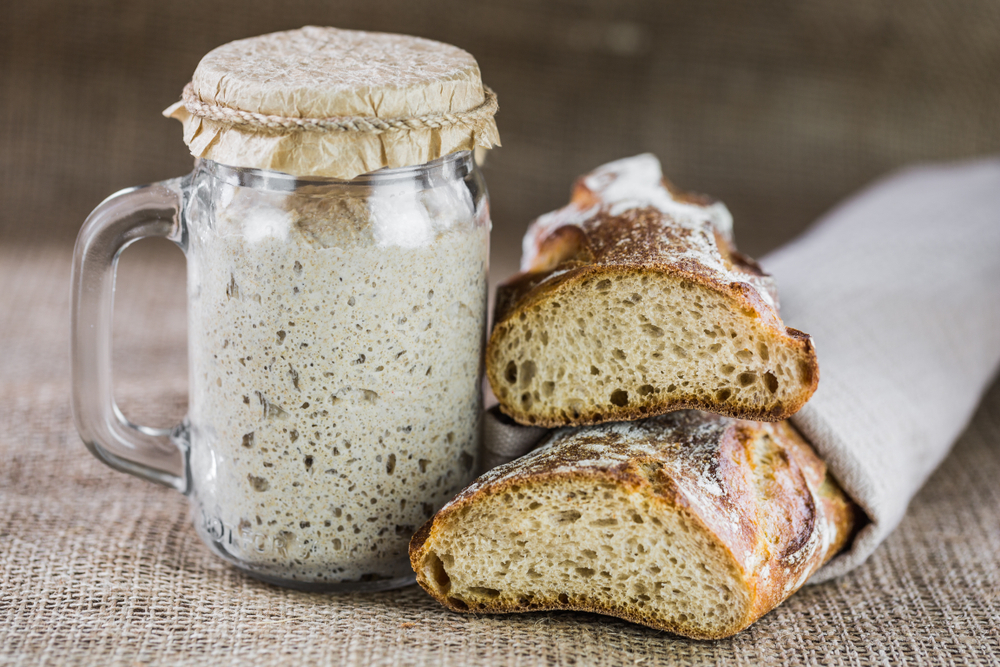Sourdough bread has become increasingly popular over the last few years; it’s a food we see plenty of in our supermarkets and bakeries. Many people prefer the taste and texture to other breads, but it’s also often gentler on the digestion. So, what has driven sourdough’s popularity and what are its health benefits?
Clinical Nutritionist Suzie Sawyer shares the delights of sourdough bread, its special qualities, and nutritional benefits.
What is sourdough bread?

Sourdough bread is not a new concept; it’s just gained much commercial awareness over the last few years, especially as we’ve understood more about the gut microbiome and the health benefits of the bacteria that reside inside.
Essentially, sourdough bread in its simplest form is created from wheat flour (brown or white), water and salt. Sourdough is actually a process whereby the ingredients are provided a suitably warm environment that encourages yeasts and bacteria to grow and thrive. They form a ‘starter material’ (known as sourdough) which creates the basis of the bread. The yeasts found in the live starter produce carbon dioxide at a slower rate than commercial baker’s yeast, with a longer rising time. Whilst this is happening, the amounts of beneficial bacteria increase, which is also part of its very distinctive taste.
The September Sourdough Campaign is bringing awareness to its health benefits but also encouraging consumers to say ‘no’ to “sour-faux”; bread that’s not true sourdough. To be ‘real sourdough’ it must not contain any additives, commercial baking powder, baker’s yeast or flavourings such as yoghurt or vinegar.
What are the benefits to the digestive system?

Many people swap to eating sourdough bread because they find it kinder on the digestive system. This may be down to real sourdough having very simple ingredients. However, sourdough contains a wide range of bacteria, including the all-important Lactobacillus species, which are resident in our gut microbiomes naturally.
Sourdough also provides lactic acid bacteria, which are essentially ‘helpers’ in the digestive tract, and Saccharomyces cerevisiae, a beneficial yeast which helps crowd out yeasts that are not healthy for the gut.
The fermentation process also encourages production of prebiotics, which feed the probiotics in the digestive tract. Importantly, although sourdough is not gluten free, people who struggle to digest gluten find it kinder on the system. This is because the fermentation process breaks down large compounds found in gluten grains, making everything run much smoother. However, for any of us who are coeliac or have an allergy to gluten, then unfortunately, we’re unlikely to be able to tolerate sourdough.
What about its nutritional content?

Most breads contain phytic acid which is known to affect the body’s ability to absorb certain minerals. Interestingly, the lactic acid bacteria in sourdough lower its pH value which in turn deactivates the phytate content. It would seem that the combination of low pH and lactic acid increase the antioxidant content of the bread, therefore helping protect the body from degenerative diseases.
Sourdough naturally contains good amounts of potassium, which is great for the heart and blood pressure. It also contains phosphate, needed for the bones and magnesium, essential for the bones and nervous system. And finally, it contains zinc which is supportive of the immune system.
Are there other health benefits?
Another benefit of eating sourdough bread seems to be supporting blood sugar balance. The fermentation process changes the structure of the carbohydrate molecules in the bread which reduce insulin spikes, compared to other breads. This is really helpful for anyone looking to manage their weight, but also for those of us who suffer from the daily highs and lows of blood sugar imbalances. Hopefully, mood and energy will also be better regulated from swapping to sourdough.
Make it a Sourdough September not a “Sour-faux” September!















Add comment